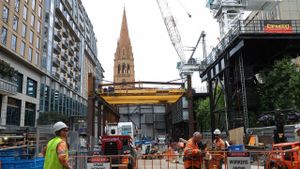The Australian government is once again under scrutiny for its immigration policies, particularly its detention practices related to non-citizens awaiting decisions on protection visas. This issue has come to the forefront as two non-citizens, whose circumstances cast doubt on the constitutional validity of such detentions, seek to have their challenging conditions reviewed by the High Court of Australia.
The first individual, referred to by the pseudonym CZA19, is originally from Poland, with his troubles beginning when his tourist visa was revoked back in August 2010. Charged with drug importation, he spent nearly eleven years serving time. After serving his sentence, he found himself in police custody for several years, only experiencing brief periods of freedom, including one occasion when he escaped from prison.
The second applicant, DBD24, hails from Vietnam and arrived by boat just last year. Initially allowed to stay under community detention, DBD24 soon absconded and has since remained elusive, which has significantly complicated his immigration status.
These cases exemplify the delicate balancing act the Australian government is attempting to manage—as it seeks to enforce its laws, it must also navigate the constitutional rights of those affected. Critics argue these detentions serve as punitive measures rather than legitimate legal processes aimed at assessing visa applications. According to legal experts, the government's stance on detaining individuals solely for their immigration status appears to violate the principles of justice and human rights.
"Such detention is just punitive limbo—an unnecessary burden for these individuals who will eventually be released once their visa applications are processed, irrespective of the outcome," stated one vocal opponent of the current immigration policy.
Australia's legal framework allows for the detention of non-citizens during the assessment phase of their visa applications, but there is growing concern this power is being leveraged excessively and, at times, unconstitutionally. If the High Court rules against the government's policies, it could initiate changes to existing practices, though only likely to affect a small number of detainees.
Past experiences point to significant outcomes stemming from similar legal challenges. For example, there was the notable NZYQ case where the High Court ruled against the government’s excessive measures, prompting much-needed reviews of detention protocols. It raises the question: how far should the government go to maintain its immigration policies, especially when doing so can infringe on human rights?
The controversy is compounded by public sentiment, which remains divided over immigration matters. While some advocate for stringent measures against those entering Australia illicitly, others empathize with the struggles of individuals seeking refuge, arguing for compassion and humane treatment.
Challenging the current policies also involves exploring how they align with Australia’s broader international obligations. Human rights advocates are calling for transparency and fairness, emphasizing the need for accountability within the immigration system.
While the government fights to maintain its authority, legal representatives for CZA19 and DBD24 push back, aiming to redefine the narrative surrounding immigration detention. Their strategy hinges on questioning the legitimacy of detaining individuals preemptively, arguing it serves only to ostracize rather than protect.
Australia's immigration policies have long been contentious, and with every legal challenge, there seems to be renewed scrutiny on how these practices align with the nation's values and legal standards.
The stakes are high—not just for the applicants but for the government which, if found wanting, could see repercussions for its handling of immigration, ranging from policy reform to shifts in public opinion. It's a tangled web of law, policy, and emotion, with none of it likely to be resolved any time soon. For now, attention turns to the courts, where the fate of these non-citizens—and perhaps the future of Australia’s immigration policies—waits for resolution through judicial courage and clarity.



